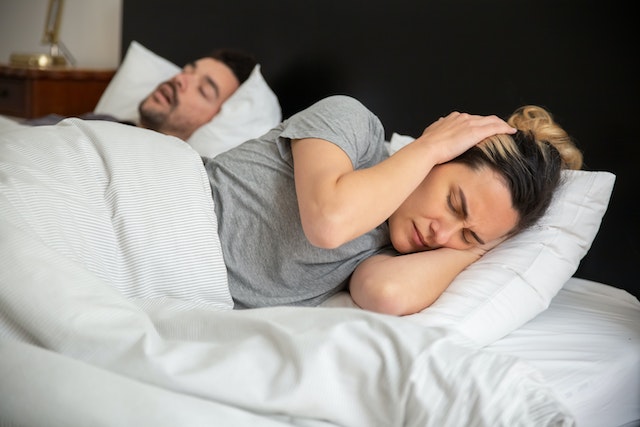Snoring is the sound made when your airway is partially closed and air is forced through it. You snore because the tissues at the top of your airway rub against one another and vibrate3. Almost all grownups snore occasionally.
The majority of people find snoring to be merely embarrassing or annoying. Snoring, however, can be problematic for certain people or signify a serious health concern. Snoring occurs for various reasons in different persons. You may discover how to stop snoring while you sleep and determine whether you need to speak with a doctor about your snoring by trying a range of strategies.
Make adjustments for bedtime
Many people who snore during the night can do so by making one or more little modifications.
Go to bed on your side.
The sleeping position affects your likelihood of snoring. The supine position, usually known as sleeping on one’s back, increases the likelihood of snoring in individuals4. On the other hand, those who sleep on their sides, often known as a lateral position, snore less. People who snore less when their heads are moved to the side may have a greater tendency to snore owing to head position than body position.
Try sleeping on your side if you often sleep on your back and are aware that you snore at night. If you are having problems changing your sleeping habits, think about employing pillows in clever ways to keep you comfortable and on your side while you sleep.
Put on a nasal dilator or strip
The purpose of internal and external nasal dilators is to increase airflow while you sleep. They could thus lessen snoring6. These little devices are reasonably priced and accessible over-the-counter at most drug stores as well as online.
Both kind of nasal dilators are tiny, flexible strips that widen the nasal airways by applying tension on them. A nasal strip, also known as an external dilator, is adhered to the exterior of the nose. It pulls outward in an effort to maintain its shape, raising the skin on the nose and widening the nasal passages. A nasal dilator that is internal works similarly, but from the inside. It pushes outward rather than pushing on the outside of the nose. Both types of dilators can reduce snoring, according to studies, but internal dilators are frequently more efficient.
Use a mouthpiece to prevent snoring
There are numerous dental appliances available to reduce snoring7. Since they are bigger and stay in the mouth all night, these anti-snoring mouthpieces may require more time to get used to than nasal strips. There are typically two types of anti-snoring mouthguards that are available over-the-counter.
Mandibular advancement devices, or MADs, are a popular style of mouthpiece used to stop snoring. These mouthguards are typically adjusted so that they advance your lower jaw after being made to fit your teeth. This simple jaw realignment aids in snoring reduction8.
Another type of anti-snoring mouthpiece is a tongue stabilization device (TSD), also referred to as a TRD. This mouthpiece also fits in between the teeth like a MAD. But it maintains the tongue in place rather than moving the lower jaw. The tongue is prevented from sliding back into the throat by a small suction-operated portion of the mouthpiece. A tongue-retention device reduced snoring intensity by 68% in one study9.
Anti-snoring dental appliances can improve mild to moderate obstructive sleep apnea in addition to reducing snoring. But people who have sleep apnea shouldn’t self-diagnose or self-treat it. Use dental equipment for sleep apnea only with your doctor’s permission.
Make Behavioral Changes
Some people attempt sleeping on their side and using a nasal dilator or mouthpiece to stop snoring, but they still experience the problem. If it applies to you, it might be time to think about changing your lifestyle in a more major way.
Body Weight Loss
One of the earliest and most crucial therapies for snoring, according to experts, is weight loss10. Of course, this advice only applies to those who are obese or overweight. Based on your height, weight, and waistline, the National Heart, Lung, and Blood Institute has a simple formula that you may use to evaluate whether or not you have a healthy weight11.
Consider losing weight if you are overweight or obese, like over 74% of Americans12 are. Obstructive sleep apnea and snoring are both more common in obese people13. Snoring and the symptoms of obstructive sleep apnea are both lessened by weight loss in adults with high body mass indices, according to research.
Make sure you use a healthy weight-loss strategy. Crash diets are risky and rarely effective over the long term. Instead, adhere to the guidelines provided by the Centers for Disease Control for maintaining a balanced diet14 and including physical activity15 into your life.
Examine mouth exercises
Consider mouth exercises to stop snoring in addition to general exercise. These activities, sometimes referred to as oropharyngeal exercises in the medical community16, have been shown to significantly lessen snoring.
To develop the muscles in the tongue, soft palate, and throat, mouth workouts entail regularly moving your tongue and other mouth-related body parts17. In one study, mouth exercises for three months reduced snoring by 59%.
Stop smoking.
Increased snoring has been linked to cigarette smoking18. On the other hand, giving up smoking can help with your snoring issue. In addition, snoring is more common in children of smokers. If you smoke and your kids start snoring, giving up smoking may be able to help them stop as well.
Snoring is undoubtedly among the more minor issues brought on by cigarette smoking. In addition to shortening each smoker’s life expectancy by an average of ten years (19), cigarettes are also responsible for roughly one-third of coronary heart disease fatalities and 90% of lung cancer cases in the United States.
Don’t drink alcohol before bed
Not only can drinking before bed enhance snoring20, but it can also cause obstructive sleep apnea in persons who don’t already have the condition. Since alcohol’s impact on snoring and sleep is dose-dependent, if you frequently consume many drinks, start by reducing your intake. If it doesn’t help, try to cut back on drinking a few hours before night or think about quitting alcohol entirely.
Think about surgical procedures
Sometimes physical problems that can be treated surgically by doctors cause snoring. Surgery should only be considered as a last option, however some procedures have been shown to lessen snoring. The only way to know if you might benefit from surgery is to visit a doctor.
Using a laser for uvulopalatoplasty
In a procedure called laser-assisted uvulopalatoplasty, a surgeon uses a laser to cut away tissue from the soft palate and the uvula in the throat. As a result, the soft palate stiffens as tissue grows where it was laser-ablated and the neck enables more airflow.
For about 30 years21, this procedure has been used to treat snoring and obstructive sleep apnea. Despite growing controversy in recent years because to a high incidence of unfavorable side effects, some doctors still believe the surgery to be useful. Many surgeons no longer provide laser-assisted uvulopalatoplasty as a result.
implanted palate
Palatal implants are a less invasive surgery alternative for stiffening the soft palate, similar to laser-assisted uvulopalatoplasty. However, palatal implants are significantly less contentious. Studies reveal that for some persons, the implants considerably reduce snoring22. As a treatment for obstructive sleep apnea, doctors may recommend palatal implants in addition to snoring.
Somnoplasty
In that procedure can be used to trim tissue from the uvula and stiffen the soft palate, somnoplasty has features in common with both laser-assisted uvulopalatoplasty and palatal implants. Radio waves are used in somnoplasty to change the tissues in the mouth and throat rather than lasers or implants. According to research, somnoplasty can significantly eliminate snoring in some people, although not as well as palatal implants.
When to Consult Your Physician
When snoring is caused by an underlying medical problem, you sometimes can’t stop it by treating the immediate cause. People with obstructive sleep apnea23 may snore in addition to other symptoms such daytime fatigue, morning headaches, gasping or choking while asleep, and feeling groggy upon awakening.
Consult a doctor if you think that your snoring is an indication of obstructive sleep apnea. The other symptoms of this illness can be relieved when your snoring is resolved or considerably reduced after receiving a diagnosis and therapy.










